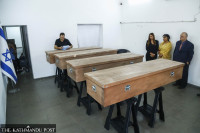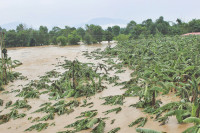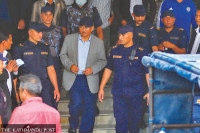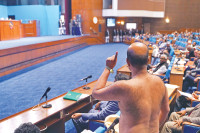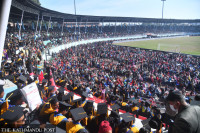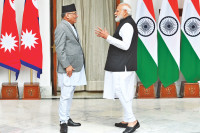Special Supplement
Yearender 2023: Nepal’s diplomacy stretched thin
Prime Minister Dahal has an uphill battle as Nepal seeks to balance relations with its giant neighbours India and China amid growing US interest in the country.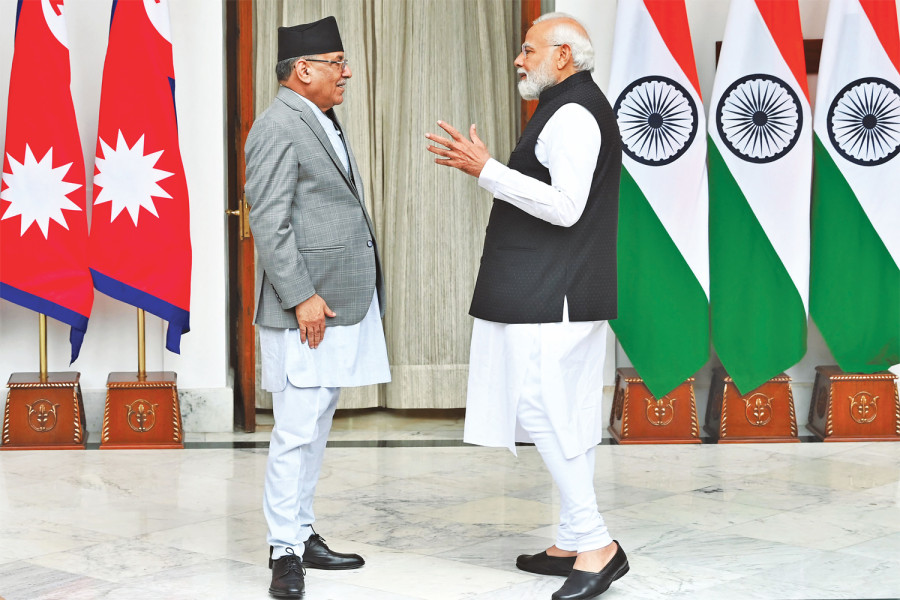
Anil Giri
2023 has been an interesting time for Nepali diplomacy.
After the end of the Covid pandemic, the Russia-Ukraine war raged. Global affairs have been more troubled with the addition of the Israel-Hamas conflict. As Nepalis have been directly involved in both theatres, Nepal’s foreign outreach is strained.
Nepal has much to do to secure the release of Bipin Joshi from the captivity of the Palestinian militant group and to bring home safely the Nepalis captured by the Ukrainian military. Four Nepalis fighting for Russia have been captured by Ukraine’s armed forces.
In Kathmandu, though, the foreign ministry is busy. One after another high-level visits from the United States, right from the year’s beginning, put Nepal on the radar of its two immediate neighbours—India and China.
It started with the $500 million US aid to Nepal and increasing support from the US Agency for International Development (USAID).
Prime Minister Pushpa Kamal Dahal’s participation in the Democracy Summit organised by US President Joe Biden was a kinly watched event too.
Some of these visits drew serious concerns from Beijing. As the US and China compete on several global fronts, China also tightened its shoestrings and started sending high-level delegations in quick succession in its bid to neutralise growing American engagement in Kathmandu and what it reads as the growing US clout in Nepal.
In January, Deputy Secretary of State for Political Affairs Victoria Nuland visited Kathmandu and urged Nepal’s political leaders to be cautious while dealing with neighbours, particularly on economic partnerships.
In the second week of February, USAID Administrator Samantha Power came to Nepal on a two-day visit. On her heels, Afreen Akhter—deputy assistant secretary of state in the Bureau of South and Central Asian Affairs for Nepal, Sri Lanka, Bangladesh, Bhutan, and the Maldives—made a trip to Kathmandu.
The visits continued.
There were also reports in the media that US Central Intelligence Agency (CIA) chief Williams Burns wanted to visit Nepal later in February but Prime Minister Dahal did not entertain the idea. Burns was supposed to arrive in Nepal from Sri Lanka.
In response to the increasing Nepal-US engagement, China started using its soft power. It lifted the Covid restrictions put in place since early 2020 and opened some of the entry points with Nepal in a sign of mending ties with the Dahal government.
China started inviting political leaders, party delegations, representatives from the media, civil society, security officials, government officials, and members of the civil society, and provincial and local government officials from Nepal to tour the country.
It was reciprocal. Chinese visitors, from the political and diplomatic fronts, also started to increase.
The back-to-back visits from China and the US put Kathmandu in a geopolitical flux, inviting India, too, to flex its muscles. However, New Delhi remained a mute spectator of the geopolitical developments in Kathmandu.
The southern neighbour’s approach, however, was different. It courted and engaged Dahal quietly.
Meanwhile, Prime Minister Dahal sensed this opportunity to reach out to India. Unlike his first premiership in 2008, he decided to visit India first, even though he had been invited to China’s Boao Forum for Asia in March. That reassured the Delhi officialdom that Dahal would not be playing the China card in Nepal’s dealings with India.
Officials close to the prime minster said that Nepal still has to do a rebalancing of its ties with its giant twin neighbours so as to avoid the country’s dependency on either of them.
In a bigger arc, Nepal took the chair of the Global Coordination Bureau of the Least Developed Countries (LDCs) in April after five years of stewardship by Malawi.
The bureau is mandated to promote and protect the interests of LDCs, which are low-income countries confronting severe structural impediments to sustainable development. This was a feather in Nepal’s diplomatic hat.
The ruling coalition took much time to appoint the foreign minister, creating an initial vacuum after the governing coalition was formed in December last year.
Despite China’s invitation to participate in the Boao Forum for Asia, Prime Minister Dahal did not want to break the tradition of Nepali prime ministers preferring to visit India before China.
Some crucial agreements—exporting 10,000 megawatts of power in ten years for instance—were agreed upon during Dahal’s visit even though the deal is yet to be formalised. When Dahal, the leader of the distant third political party in Nepal, became the prime minister, India readily trusted him.
Some of the contiguous issues and concerns of Nepal like receiving the report of the Eminent Persons Group on Nepal-India relations, Indian approval for air entry routes, widening trade deficit with the neighbour, and differences over finalising the detailed project report of Pancheshwar multipurpose project were discussed but lacked concrete outcomes.
Disagreement over border and boundary lingered despite the prime minister’s tall claims to resolve the issues with Delhi. Dahal’s India visit became controversial for the way he visited a Hindu temple in Ujjain, Madhya Pradesh.
Back home, too, he was criticised.
The prime minister could not give a convincing answer when the intent of his temple visit was questioned.
Later, Dahal visited Italy and invited UN Secretary General António Guterres to visit Nepal.
He then visited New York to take part in the 78th session of the United Nations General Assembly.
After participating in the General Assembly, Dahal left New York for Beijing on an official visit. There was a tradition of the chair of the South Asian Association of Regional Cooperation convening the meeting of SAARC foreign ministers on the sidelines of the annual UN assembly.
Nepal had called a meeting of the SAARC foreign ministers but the plan did not materialise.
The regional aspiration of multilateralism has taken a back seat again. It’s unfortunate that SAARC is stalled at a time when Nepal is its longest-serving chair. The regional summits have not been held for years, and the eight-nation bloc’s foreign ministers have stopped meeting, making SAARC defunct.
In September, Dahal was a guest at the Asian Games inauguration in China. He met President Xi Jinping and returned his contacts, assurance and commitment he had given to Chinese leadership earlier. Observers in Nepal say Chinese officials are aware of Nepal’s geopolitical compulsions and its leaders’ resultant dilemmas.
Dahal did not push his Chinese counterpart to sign the Belt and Road Initiative (BRI) implementation plan and expedite projects under the initiative.
He did not touch upon China’s ambitious Global Security Initiative and Global Civilizational Initiative and decided to stay away from these two initiatives of President Xi Jinping.
The Chinese, however, sought Nepal’s assurance on the One-China Policy and Nepal’s strong commitment to Beijing’s Taiwan cause.
Without delving much into securing Nepal’s interest, Dahal’s visit was his weeklong holiday in China as he visited Tibet, among other places.
The real test of Nepal’s diplomacy began on October 8, when the Hamas militants attacked Israel in which ten Nepali nationals were killed. Still, Bipin Joshi, who was taken hostage, is in Hamas’ captivity.
Over 300 Nepalis who were living and working in Israel were flown home.
Nepal reiterated its old position and chose to support Israel in its fight against Hamas. But Nepal also voted in favour of an immediate ceasefire in Gaza, calling for an end to the brutal killings of thousands of children and innocent Palestinians.
As the war between Russia and Ukraine lingered, Russian President Vladimir Putin issued a decree in May paving the way for the recruitment of foreign nationals in its army. In the lure of money and opportunities, Nepali youths have been joining the Russian army even as Nepal does not permit it.
So far, seven Nepali nationals have been confirmed dead while fighting for the Russians.
Foreign Minister NP Saud recently said he had received complaints that around a hundred Nepali citizens who joined the Russian army have gone missing. He said that over 200 Nepali citizens are currently serving in the Russian army.
The government has summoned the Russian ambassador and dispatched two diplomatic notes to Moscow, urging it to stop recruiting Nepalis in its fighting forces and send back those Nepalis who are currently fighting its war against Ukraine. Russia has yet to respond.
UN Secretary-General Guterres, who visited Nepal in October, raised the issue of global warming affecting the Himalayas. He visited two places in Nepal and briefed the world community on the adverse effects of climate change on livelihoods.
Guterres released a video from the Everest region and highlighted the plight of local residents caused by the effects of the climate crisis.
He echoed similar sentiments at the COP28 summit in Dubai.
“In multilateral forums, Nepal’s presentation was commendable,” says Rupak Sapkota, foreign relations adviser to the prime minister. International relations overall saw various ups and downs due to Covid but the situation was normalised in the year 2023, said Sapkota. The way Nepal presented itself in international forums like in Rome, Italy, the New York UN General Assembly or at COP28, even those critical of the government are also praising its efforts.
“Our relations and level of trust have increased and been strengthened with both India and China. Second, our good homework for presentations in major global forums was praiseworthy,” Sapkota added.
Foreign Minister Saud claimed that some important initiatives were taken while conducting the country’s foreign policy. “There has been a major improvement in our international relations in a year,” Saud told the RSS news agency in a recent interview.
“Friendship with India has further strengthened and Prime Minister Dahal's visit to China was successful, too.”




 19.57°C Kathmandu
19.57°C Kathmandu
